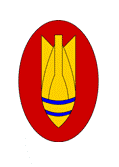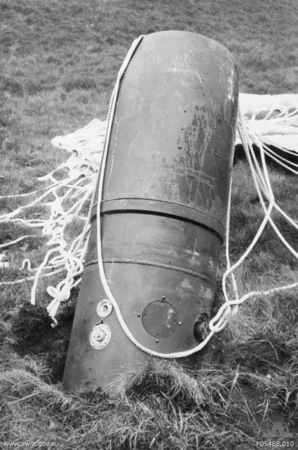

101 (City of London) Engineer Regiment
(Explosive Ordnance Disposal & Search)
Regimental Association
85 Years of Bomb Disposal - An Introduction 
This was the thought running through Major George Fletcher MBE GM RE as he prepared to deal with the disposal of a World War Two (WW2) Type C parachute mine found during building excavations in a busy London street . They had originally been designed as an anti-ship weapon, 9ft long containing 1500lbs of explosives but had been modified to drop on London during the Blitz to devastating effect. The unexploded bomb had lain uncovered for 25 years and contained multiple detonators with an uncertain fuzing system and anti-handling devices. Knowing that any movement or external influence could set off the Unexploded Bomb (UXO) Fletcher and his team decided to remove the filling plate and steam out the explosives which was much quicker than digging down to expose all the fuzes and neutralising them before steaming. This took all night where Fletcher and his team were exposed to the risk of the UXO detonating for which he received the George Medal.
 One would suggest that this or similar thoughts occur to all Bomb Disposal (BD) operators as they prepare themselves for an operation and indicate the intellect, rational thought process and curiosity that typify these men and women. They have to be focused on the task and try to out-think the design and thought process behind the bombs construction. After all, it may be a leading edge device from an industrialised nation, a sophisticated device produced by a terrorist with a network of support from like-minded individuals to a crank or criminal and a homemade Improvised Explosive Device (IED). They have to out-think or rely on intelligence or previous experience to enable them to deliver a successful outcome. They may be the first to try and deal with a new device and must consider the possibility of a secondary device in the form of a booby trap, designed to outwit them.
One would suggest that this or similar thoughts occur to all Bomb Disposal (BD) operators as they prepare themselves for an operation and indicate the intellect, rational thought process and curiosity that typify these men and women. They have to be focused on the task and try to out-think the design and thought process behind the bombs construction. After all, it may be a leading edge device from an industrialised nation, a sophisticated device produced by a terrorist with a network of support from like-minded individuals to a crank or criminal and a homemade Improvised Explosive Device (IED). They have to out-think or rely on intelligence or previous experience to enable them to deliver a successful outcome. They may be the first to try and deal with a new device and must consider the possibility of a secondary device in the form of a booby trap, designed to outwit them.From the early times to Bomb Disposal capability of today, like minded individuals have migrated towards this high risk employment. They are very well supported by a wealth of Operational experience (most recently Operations BANNER (Northern Ireland), TELIC (Iraq) and HERRICK (Afghanistan), they are well trained and have an array of sophisticated equipment to do the job.

